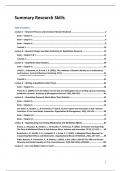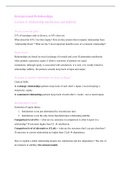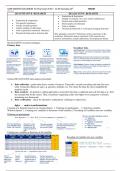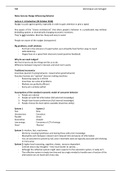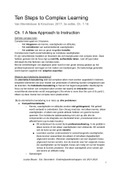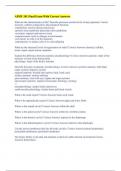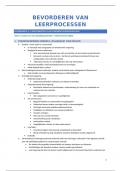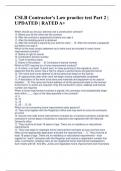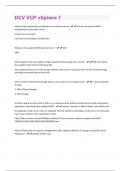Summary Research Skills
Table of Contents
Lecture 1 – Research Process and Literature Review Revisited ....................................................... 2
Book – Chapter 2 .................................................................................................................................. 6
Book – Chapter 3 .................................................................................................................................. 8
Book – Chapter 4 .................................................................................................................................. 8
Tutorial 1 ............................................................................................................................................ 10
Lecture 2 – Research Design and Data Collection for Qualitative Research ................................... 14
Book – Chapter 5 & 7.......................................................................................................................... 25
Tutorial 2 ............................................................................................................................................ 26
Lecture 3 – Qualitative Data Analysis.......................................................................................... 30
Book – Chapter 8 ................................................................................................................................ 36
O'Neil, I., Ucbasaran, D., & York, J. G. (2022). The evolution of founder identity as an authenticity
work process. Journal of Business Venturing, 37(1). .......................................................................... 37
Questions from in-class discussion ................................................................................................................................. 39
Tutorial 3 ............................................................................................................................................ 43
Lecture 4 – Writing a Qualitative Data Thesis.............................................................................. 45
Book – Chapter 14 .............................................................................................................................. 48
Pratt, M. G. (2009). From the editors: for the lack of a boilerplate: tips on writing up (and reviewing)
qualitative research. Academy of Management Journal, 52(5), 856–862. .......................................... 49
Lecture 5 – Quantitive Research: Much More Than Statistics ....................................................... 52
Book – Chapter 6 ................................................................................................................................ 58
Book – Chapter 9 ................................................................................................................................ 61
van Uden, A., Knoben, J., & Vermeulen, P. (2017). Human Capital and Innovation in Sub- Saharan
Countries: A Firm Level Study. Innovation: Organization & Management, 19(2), 103-124. ................ 68
Book – Chapter 10 .............................................................................................................................. 74
Book – Chapter 11 .............................................................................................................................. 79
Lecture 6 – Hypothesizing and Testing Moderation and Mediation Effects ................................... 87
Barasa, L., Kinyanjui, B., Knoben, J., Vermeulen, P., & Kimuyu, P. (2021). Innovation and Exporting:
The Case of Mediation Effects in Sub-Saharan Africa. Industry and Innovation, 28 (2), 113-135. ....... 96
Busenbark, J. R., Graffin, S. D., Campbell, R. J., & Lee, E. Y. (2022). A Marginal Effects Approach to
Interpreting Main Effects and Moderation. Organizational Research Methods, 25(1), 147–169. ...... 98
Ritter-Hayashi, D. Vermeulen, P., & Knoben, J. (2019). Is this a Man’s World? The Effect of Gender
Diversity and Gender Equality on Firm Innovativeness. PLOS ONE.14(9): e0222433. ....................... 102
Lecture 7 – Do I Test What I Claim To Test? ............................................................................... 106
1
,Lecture 1 – Research Process and Literature Review Revisited
Qualitative research
By “qualitative research” we mean a study that uses semi-structured interviews to collect data on
research questions that focus on process, people, decisions, and the “how” or “why” of the
phenomenon under study. Important issues discussed in this part include:
- Constructing a conceptual model and using it to create a topic list
- Collecting qualitative data through semi-structured interviews
- Analyzing qualitative data
Quantitative research
By “quantitative research”, we mean a study that develops hypotheses and then tests them
statistically with numerical data. Important issues discussed in this part include:
- Development of hypotheses
- Research Design
- Measurement reliability and validity
- How to build a dataset
- Testing of hypotheses using regression analysis
- Moderation and mediation analyses
Key differences:
- Nature of data: Qualitative (textual, non-numeric) vs. Quantitative (numeric, structured).
- Research purpose: Exploratory vs. Hypothesis testing.
- Data collection methods: Interviews vs. data bases.
- Analysis methods: Coding process vs. Statistical analysis.
Applies to both qualitative and quantitative
Managers and researchers
- Both managers and researchers do research to analyze and solve problems
- The academic researcher has to work systematically and must explain
o How data is collected
o How data is analyzed
o What the limitations are of the research (and what consequences)
Originality in research
- Originality is a basic condition for a scientific study
- ‘Originality’ describes studies that create a new dimension to already existing knowledge, for
example
o Some novel twist, fresh perspective
o New hypothesis or assumption
o New and innovative methods of handling an existing topic/knowledge
- There needs to be a balance: it does not have to be completely new; has to be based on
existing knowledge
- Limitations from a position as a master student: time, access, complexity
2
,Induction
- Induction is based on empirical evidence
- Through induction we draw general conclusions from our empirical observations
- The process goes from observations → analysis→ findings → theory building
- This type of research is often associated with the qualitative type of research
Deduction
- Deduction is based on logic: the logic that from existing research you can formulate the
hypothesis, and with new research (from data) you can test it
- The researcher builds/deduces hypotheses from the existing knowledge (literature), which
can be subject to empirical scrutiny (testing) and thus can be accepted or rejected
- This type of research is often associated with the quantitative type of research
- Deductive reasoning (1) – the logical process of deriving a conclusion from a
known premise or something known as true
- Inductive reasoning (2) – the systematic process of establishing a general
proposition on the basis of observation or particular facts
Abduction
- Not just a combination of induction and deduction
- A theoretical interpretation of an empirical problem that can lead to development of new
theories
o Start with a theory. You have an empirical problem in mind (e.g. How can
sustainable enterprises make more impact?)
o Induction would entail that you would just start asking people
o Abduction connects theory with empirical evidence (together the theoretical
framework)
▪ Assumption is starting point
- The original framework and theoretical assumptions of the researcher are continuously
modified as a result of empirical findings
Translation to master thesis
- Deductive studies use quantitative methods and start with the development of hypotheses,
based on theory
- Abductive studies use qualitative methods and use the literature to identify
concepts that might be relevant to the problem and situation under study
- Inductive studies are not used, mainly because of time constraints
Research process
- Research is often thought of as a process, that is a set of activities unfolding
over time
- A process has a few distinct stages, as different stages entail different tasks
- In reality, however, the process is not so orderly and sequential → iterative
process
3
, Research progress
- The starting point is the research topic, that is the phenomenon or theme to be studied
(what you can find literature about)
- In a subsequent step, a more specific question is addressed within this topic
Levels of research
- All research requires activities at the conceptual level
- So-called ‘theoretical studies’ deal only with this level (1)
- An empirical study requires efforts at the conceptual level (2)
A master thesis is an empirical study and requires efforts at the
conceptual level as well as efforts at the empirical level
Definitions of important elements of research
Concepts
- A concept is an abstraction representing an object, a property of an object, or a certain
phenomenon
o Concepts are the foundation of communication
o Concepts introduce a perspective
o Concepts are means of classification and generalization
o Concepts serve as components of theories (models)
- Concepts are the most critical element in any theory, because they direct what is captured
Definitions
- Definitions that describe concepts by using other concepts are conceptual definitions. A
useful definition is that concepts should:
o point out unique attributes or qualities of whatever is defined;
o not be circular, i.e. must not contain any part of the thing being defined; defining
‘market exchange’ as ‘exchange taking place in the market’ does not enhance
communication;
o be stated positively, i.e. contain the properties of the concept defined;
o use clear terms
- Operational definition is a set of procedures that describe the activities to be performed to
establish empirically the existence or degree of existence of what is described by a concept
- When we move from the conceptual to the empirical level in research, concepts are
converted into variables (independent and dependent) by mapping them into a set of
numbers (e.g. numbers for regression analysis)
- Reflect on the following description and discuss if this is true for all types of research:
“When we move from the conceptual to the empirical level in research, concepts
are converted into variables by mapping them into a set of numbers”
→ For quantitative research: perfect match
→ For qualitative research: not necessary to use numbers; instead, words are used
4
Table of Contents
Lecture 1 – Research Process and Literature Review Revisited ....................................................... 2
Book – Chapter 2 .................................................................................................................................. 6
Book – Chapter 3 .................................................................................................................................. 8
Book – Chapter 4 .................................................................................................................................. 8
Tutorial 1 ............................................................................................................................................ 10
Lecture 2 – Research Design and Data Collection for Qualitative Research ................................... 14
Book – Chapter 5 & 7.......................................................................................................................... 25
Tutorial 2 ............................................................................................................................................ 26
Lecture 3 – Qualitative Data Analysis.......................................................................................... 30
Book – Chapter 8 ................................................................................................................................ 36
O'Neil, I., Ucbasaran, D., & York, J. G. (2022). The evolution of founder identity as an authenticity
work process. Journal of Business Venturing, 37(1). .......................................................................... 37
Questions from in-class discussion ................................................................................................................................. 39
Tutorial 3 ............................................................................................................................................ 43
Lecture 4 – Writing a Qualitative Data Thesis.............................................................................. 45
Book – Chapter 14 .............................................................................................................................. 48
Pratt, M. G. (2009). From the editors: for the lack of a boilerplate: tips on writing up (and reviewing)
qualitative research. Academy of Management Journal, 52(5), 856–862. .......................................... 49
Lecture 5 – Quantitive Research: Much More Than Statistics ....................................................... 52
Book – Chapter 6 ................................................................................................................................ 58
Book – Chapter 9 ................................................................................................................................ 61
van Uden, A., Knoben, J., & Vermeulen, P. (2017). Human Capital and Innovation in Sub- Saharan
Countries: A Firm Level Study. Innovation: Organization & Management, 19(2), 103-124. ................ 68
Book – Chapter 10 .............................................................................................................................. 74
Book – Chapter 11 .............................................................................................................................. 79
Lecture 6 – Hypothesizing and Testing Moderation and Mediation Effects ................................... 87
Barasa, L., Kinyanjui, B., Knoben, J., Vermeulen, P., & Kimuyu, P. (2021). Innovation and Exporting:
The Case of Mediation Effects in Sub-Saharan Africa. Industry and Innovation, 28 (2), 113-135. ....... 96
Busenbark, J. R., Graffin, S. D., Campbell, R. J., & Lee, E. Y. (2022). A Marginal Effects Approach to
Interpreting Main Effects and Moderation. Organizational Research Methods, 25(1), 147–169. ...... 98
Ritter-Hayashi, D. Vermeulen, P., & Knoben, J. (2019). Is this a Man’s World? The Effect of Gender
Diversity and Gender Equality on Firm Innovativeness. PLOS ONE.14(9): e0222433. ....................... 102
Lecture 7 – Do I Test What I Claim To Test? ............................................................................... 106
1
,Lecture 1 – Research Process and Literature Review Revisited
Qualitative research
By “qualitative research” we mean a study that uses semi-structured interviews to collect data on
research questions that focus on process, people, decisions, and the “how” or “why” of the
phenomenon under study. Important issues discussed in this part include:
- Constructing a conceptual model and using it to create a topic list
- Collecting qualitative data through semi-structured interviews
- Analyzing qualitative data
Quantitative research
By “quantitative research”, we mean a study that develops hypotheses and then tests them
statistically with numerical data. Important issues discussed in this part include:
- Development of hypotheses
- Research Design
- Measurement reliability and validity
- How to build a dataset
- Testing of hypotheses using regression analysis
- Moderation and mediation analyses
Key differences:
- Nature of data: Qualitative (textual, non-numeric) vs. Quantitative (numeric, structured).
- Research purpose: Exploratory vs. Hypothesis testing.
- Data collection methods: Interviews vs. data bases.
- Analysis methods: Coding process vs. Statistical analysis.
Applies to both qualitative and quantitative
Managers and researchers
- Both managers and researchers do research to analyze and solve problems
- The academic researcher has to work systematically and must explain
o How data is collected
o How data is analyzed
o What the limitations are of the research (and what consequences)
Originality in research
- Originality is a basic condition for a scientific study
- ‘Originality’ describes studies that create a new dimension to already existing knowledge, for
example
o Some novel twist, fresh perspective
o New hypothesis or assumption
o New and innovative methods of handling an existing topic/knowledge
- There needs to be a balance: it does not have to be completely new; has to be based on
existing knowledge
- Limitations from a position as a master student: time, access, complexity
2
,Induction
- Induction is based on empirical evidence
- Through induction we draw general conclusions from our empirical observations
- The process goes from observations → analysis→ findings → theory building
- This type of research is often associated with the qualitative type of research
Deduction
- Deduction is based on logic: the logic that from existing research you can formulate the
hypothesis, and with new research (from data) you can test it
- The researcher builds/deduces hypotheses from the existing knowledge (literature), which
can be subject to empirical scrutiny (testing) and thus can be accepted or rejected
- This type of research is often associated with the quantitative type of research
- Deductive reasoning (1) – the logical process of deriving a conclusion from a
known premise or something known as true
- Inductive reasoning (2) – the systematic process of establishing a general
proposition on the basis of observation or particular facts
Abduction
- Not just a combination of induction and deduction
- A theoretical interpretation of an empirical problem that can lead to development of new
theories
o Start with a theory. You have an empirical problem in mind (e.g. How can
sustainable enterprises make more impact?)
o Induction would entail that you would just start asking people
o Abduction connects theory with empirical evidence (together the theoretical
framework)
▪ Assumption is starting point
- The original framework and theoretical assumptions of the researcher are continuously
modified as a result of empirical findings
Translation to master thesis
- Deductive studies use quantitative methods and start with the development of hypotheses,
based on theory
- Abductive studies use qualitative methods and use the literature to identify
concepts that might be relevant to the problem and situation under study
- Inductive studies are not used, mainly because of time constraints
Research process
- Research is often thought of as a process, that is a set of activities unfolding
over time
- A process has a few distinct stages, as different stages entail different tasks
- In reality, however, the process is not so orderly and sequential → iterative
process
3
, Research progress
- The starting point is the research topic, that is the phenomenon or theme to be studied
(what you can find literature about)
- In a subsequent step, a more specific question is addressed within this topic
Levels of research
- All research requires activities at the conceptual level
- So-called ‘theoretical studies’ deal only with this level (1)
- An empirical study requires efforts at the conceptual level (2)
A master thesis is an empirical study and requires efforts at the
conceptual level as well as efforts at the empirical level
Definitions of important elements of research
Concepts
- A concept is an abstraction representing an object, a property of an object, or a certain
phenomenon
o Concepts are the foundation of communication
o Concepts introduce a perspective
o Concepts are means of classification and generalization
o Concepts serve as components of theories (models)
- Concepts are the most critical element in any theory, because they direct what is captured
Definitions
- Definitions that describe concepts by using other concepts are conceptual definitions. A
useful definition is that concepts should:
o point out unique attributes or qualities of whatever is defined;
o not be circular, i.e. must not contain any part of the thing being defined; defining
‘market exchange’ as ‘exchange taking place in the market’ does not enhance
communication;
o be stated positively, i.e. contain the properties of the concept defined;
o use clear terms
- Operational definition is a set of procedures that describe the activities to be performed to
establish empirically the existence or degree of existence of what is described by a concept
- When we move from the conceptual to the empirical level in research, concepts are
converted into variables (independent and dependent) by mapping them into a set of
numbers (e.g. numbers for regression analysis)
- Reflect on the following description and discuss if this is true for all types of research:
“When we move from the conceptual to the empirical level in research, concepts
are converted into variables by mapping them into a set of numbers”
→ For quantitative research: perfect match
→ For qualitative research: not necessary to use numbers; instead, words are used
4


